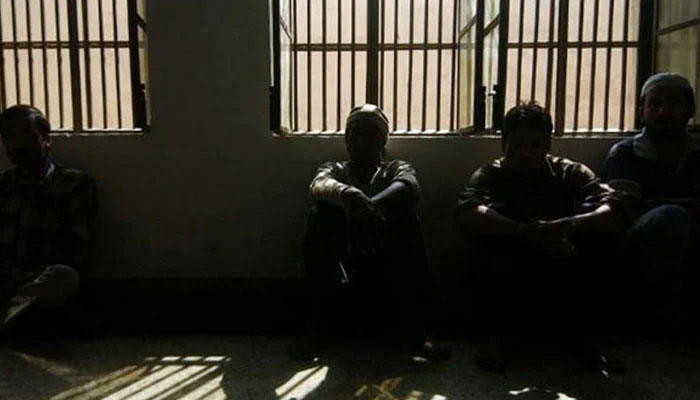Torture in the shadows
NCHR report uncovered numerous complaints of torture and cruel, inhuman, and degrading treatment suffered at the hands of jail authorities
It is often said that no one truly knows a nation until one has been inside its jails. This statement was starkly illustrated in October 2022, when the National Commission for Human Rights (NCHR) conducted an inquiry based on a complaint of custodial torture in Adiala Jail Rawalpindi filed before the Islamabad High Court (IHC).
The NCHR report uncovered numerous complaints of torture and cruel, inhuman, and degrading treatment suffered at the hands of jail authorities. Out of 35 inmates who recorded their statements, 26 prisoners (74 per cent) alleged various forms of torture and inhumane treatment. Every single inmate (100 per cent) spoke about financial extortion for accessing genuine facilities available at the jail.
There was little to no oversight by the then Oversight Committee and over the past five years only one prison official has been dismissed for violating human rights – a mere dispenser at the jail. At that point, Pakistan had no substantive law criminalizing torture.
Today, in compliance with its domestic and international commitments, and strong lobbying by civil society and the NCHR, Pakistan now has a standalone law on torture: the ‘Torture and Custodial Death (Prevention and Punishment) Act, 2022’.
Torture is an act of physical or psychological violence committed by, or at the behest of, a public official, for the purpose of coercion, confession, or any other specific objective. These elements must exist for an act of torture to be proven, and the penalty must be commensurate with the gravity of the crime. As such, the passage of the Torture and Custodial Death Act in November 2022 was an important step towards justice and accountability that specifically defined and criminalized torture. Sadly, however, nearly two years have passed, and the law remains non-operational.
For the government and relevant actors to commit effectively to the eradication of torture in Pakistan, two crucial components must be implemented. The first is the passage of operational rules under the law, which clearly define the roles and responsibilities of each stakeholder. These rules are necessary to establish a procedural framework for complaint redressal, investigation, prosecution, and compensation under the law.
To date, no one has yet been convicted under the new law. While the Federal Investigation Agency (FIA) holds exclusive jurisdiction to investigate complaints against public officials, the nature of this supervision is unclear. No functional wing dedicated to investigating custodial torture has been established at the FIA, and there is no complaint mechanism for such cases on the FIA’s official website, unlike for all other federal offences falling under its ambit.
Delays in the passage of such rules and procedures about complaints of torture have prevented the citizens of Pakistan from utilizing this vital legislation for their protection and the realization of their rights. It is imperative that these rules be passed immediately.
The second, and perhaps more complex, aspect of this issue is the matter of resources. The country faces numerous pressing challenges, each demanding its own focus and funding. The eradication of torture and the realization of human rights are, however, matters of absolute urgency. Robust legal resources, including a dedicated team of legal advisers, are crucial to ensure compliance with international standards on investigating and documenting torture, particularly the Istanbul Protocol.
Financial resources are critical to support investigative procedures, including independent forensic examinations and medical assessments. Equally crucial are technological resources, such as secure databases for case management and digital tools for evidence collection and analysis.
Additionally, public awareness and education campaigns are necessary to inform citizens of their rights, particularly those deprived of their liberty and at most risk of torture or ill-treatment and encourage the reporting of torture. Partnerships with civil society organizations and international human rights bodies can also provide support and advocacy and contribute to an effective system of checks and balances.
Finally, all personnel involved in the arrest, interrogation and detention of persons should receive training on human rights, in particular on the absolute prohibition of torture.
The people of Pakistan deserve freedom from torture and cruel treatment. There is a trust deficit in our system that must be bridged to restore confidence in the state’s ability to protect its citizens.
Today, on the International Day in Support of Victims of Torture, the NCHR stands ready to champion accountability, justice, and human rights in Pakistan. However, the government must also take a proactive and swift role in this crucial endeavour.
The writer is the chairperson of the National Commission for Human Rights (NCHR).
-
 Cardi B Finally Responds To Accusations About Destroying 'SNL' Set After Nicki Minaj Joke
Cardi B Finally Responds To Accusations About Destroying 'SNL' Set After Nicki Minaj Joke -
 Gorton And Denton By-election Result: Green Party Defeats Labour In Blow To Keir Starmer
Gorton And Denton By-election Result: Green Party Defeats Labour In Blow To Keir Starmer -
 Jack Dorsey Cuts 4,000 Roles, Says AI Requires Smaller Teams
Jack Dorsey Cuts 4,000 Roles, Says AI Requires Smaller Teams -
 Reggie Bannister Health Takes ‘difficult Turn’ Amid Dementia, Parkinson’s Battle
Reggie Bannister Health Takes ‘difficult Turn’ Amid Dementia, Parkinson’s Battle -
 'Humble Traitor' Rob Rausch Makes Unexpected Move After Betraying Maura Higgins In Season 4
'Humble Traitor' Rob Rausch Makes Unexpected Move After Betraying Maura Higgins In Season 4 -
 Sarah Ferguson Drops An Accusation Against Andrew? ‘He Just Wants Leverage’
Sarah Ferguson Drops An Accusation Against Andrew? ‘He Just Wants Leverage’ -
 Anthropic Rejects Pentagon Military AI Proposal, Holds Firm On Safety Guardrails —What’s Next?
Anthropic Rejects Pentagon Military AI Proposal, Holds Firm On Safety Guardrails —What’s Next? -
 'Traitors' Reunion Drama: Rob Rausch Defends Strategy, Makes Shocking Revelation After Victory
'Traitors' Reunion Drama: Rob Rausch Defends Strategy, Makes Shocking Revelation After Victory -
 Inside Hillary Clinton’s Epstein Testimony: Key Takeaways And Highlights Explained
Inside Hillary Clinton’s Epstein Testimony: Key Takeaways And Highlights Explained -
 'Too Hard To Be Without’: Woman Testifies Against Instagram And YouTube
'Too Hard To Be Without’: Woman Testifies Against Instagram And YouTube -
 Kendall Jenner Recalls Being ‘too Stressed’: 'I Want To Focus On Myself'
Kendall Jenner Recalls Being ‘too Stressed’: 'I Want To Focus On Myself' -
 Ethel Kennedy’s 34 Grandchildren And The Expanding Kennedy Family Legacy
Ethel Kennedy’s 34 Grandchildren And The Expanding Kennedy Family Legacy -
 Dolly Parton Achieves Major Milestone For Children's Health Advocacy
Dolly Parton Achieves Major Milestone For Children's Health Advocacy -
 'The White Lotus' Creator Mike White Calls 'Survivor' Fans 'sadistic'
'The White Lotus' Creator Mike White Calls 'Survivor' Fans 'sadistic' -
 Oilers Vs Kings: Darcy Kuemper Pulled After Allowing Four Goals In Second Period
Oilers Vs Kings: Darcy Kuemper Pulled After Allowing Four Goals In Second Period -
 Calgary Weather Warning As 30cm Snow And 130 Km/h Winds Expected
Calgary Weather Warning As 30cm Snow And 130 Km/h Winds Expected




